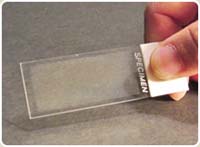
This slide includes approximately 2,000 combinations of eight enzymes used in human liver metabolism. To detect toxic drug compound reactions, the slide is “stamped” with a second slide of human organ cells. Photo by RPI/Moo-Yeal Lee and Jonathan DordickRecalls of popular prescription drugs are raising public concern about the general safety of new pharmaceuticals. A collaborative group of researchers says that identifying which drug candidates are toxic early in the discovery process can help prevent harmful pharmaceuticals from being placed on the market in the first place, and they have developed a tool to do it.
Researchers at Rensselaer Polytechnic Institute, University of California-Berkeley, and Solidus Biosciences Inc. have developed a biochip, called the MetaChip, which can analyze drug candidates for toxicity and eliminate harmful ones before they advance to pre-clinical stages. Now beginning the second phase of funding for the National Institutes of Health (NIH)-supported project, researchers are working to optimize the technology for the end user: pharmaceutical and biotechnology companies. The researchers are working to bring the MetaChip to market within a year.
"Compounds can be screened early, quickly, and effectively by the MetaChip to prevent toxic drugs from getting through the discovery process, being put on the market, and then getting recalled, such as we've seen with several high-profile cases recently," says Jonathan Dordick, the Howard P. Isermann '42 Professor of Chemical and Biological Engineering at Rensselaer.
"Weeding out toxic compounds earlier would also allow pharmaceutical companies to evaluate more compounds and more efficiently identify those that are most likely to become successful drugs," adds Douglas Clark of the Chemical Engineering Department at the University of California-Berkeley.
Dordick and Clark are also the co-founders of Solidus Biosciences, a biotech company located at the Rensselaer Incubator for start-up businesses.
The MetaChip (metabolizing enzyme toxicology assay chip) mimics the effects of metabolism in the human liver where enzymes break down, neutralize, and excrete chemicals from food and pharmaceuticals. In many cases, the metabolized chemicals, called metabolites, are harmless or even beneficial. But some metabolites are toxic, and this toxicity can be difficult to predict or find at early stages of drug discovery with current testing methods.
"The relatively slow pace of technology development in toxicology and clinical safety evaluation that could be used in early phases of drug development continues to hinder the progression of lead compounds to pharmaceuticals," Dordick says. "In addition to safety concerns, drug discovery is an extremely costly process with more than $1 billion invested in each approved drug. For the first time, the MetaChip can enable the initial and high-throughput analysis of metabolism-induced toxicology to be performed before significant resources are invested in the drug's development."
Solidus Biosciences recently received a $1.7 million, three-year award from NIH through its Small Business Technology Transfer Program to optimize the MetaChip for market. Rensselaer will receive approximately $500,000 as a sub-contractor of the award. The technology has been patented by Rensselaer Polytechnic Institute and University of California-Berkeley and licensed exclusively to Solidus Biosciences.
The MetaChip uses a culturing method by combining enzyme catalysis with cell-based screening on a single microscale chip. The drug candidates are added to a chip containing approximately 2,000 combinations of the eight enzymes used in human liver metabolism and then sandwiched with a slide of human organ cells in order to detect toxic reactions to the compound. When toxic reactions are detected, the toxic drug compounds are eliminated as potential candidates for further development as new pharmaceuticals. The researchers are also working to develop an automated MetaReader device to quickly analyze the results.
Dordick, Clark, and collaborators published findings on the MetaChip in the Jan. 25, 2005 issue of Proceedings of the National Academy of Sciences in a paper titled "Metabolizing Enzyme Toxicology Assay Chip (MetaChip) for High-Throughput Microscale Toxicity Analyses." The peer-reviewed publication defines the technology and results of testing in more detail.
Source : Rensselaer Polytechnic Institute
 Print Article
Print Article Mail to a Friend
Mail to a Friend
